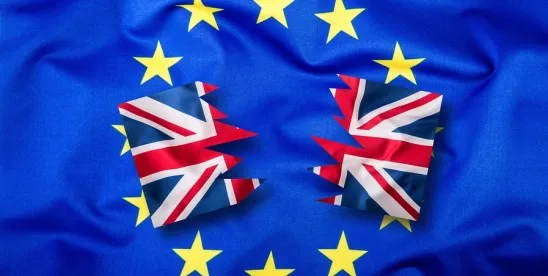On 24 May the Prime Minister conceded that her efforts to secure Parliamentary approval of the Withdrawal Agreement and Political Declaration (WA) signed off in November 2018 have failed. Publication of the Withdrawal Agreement Bill has been delayed, and it seems unlikely that the Bill will be brought to the House of Commons for its second reading, with or without the ten point offer set out in the Prime Minister's speech of 21 May. The Prime Minister's concession, together with the results of the European Parliament elections, now point towards a stark choice between "no deal" and "no Brexit".
The European Parliament election results once again demonstrated the depth of division within the UK. In England and Wales the Brexit Party secured 28 seats. The Liberal Democrats gained 15 seats, the Green Party 7 and Plaid Cymru 1. The election results were immediately portrayed as a disaster for the Conservatives, with 3 seats and Labour, with 10. Initial reactions suggest a Conservative move towards a position that would see Brexit with or without a deal by 31 October. Meanwhile, the Labour Party is under renewed pressure to adopt a clear policy in favour of a further referendum to stem the loss of pro-remain support. "No deal" and "no Brexit" now look far more likely than an exit based on the WA.
The dramatic political developments of the past week must be viewed against the essentially unchanged legal position. "No deal" remains the default outcome. Parliament averted a "no deal" Brexit on 29 March and 12 April, but the legislation relied upon for that purpose is now spent. Further legislation would be required to avert a "no deal" Brexit in October. Arguably, the European Parliament election results, together with the "hard Brexit" rhetoric likely to characterise the Conservative party leadership context, will energise and embolden those seeking Brexit at any cost.
The European Parliament election results may also have tipped the balance in terms of the EU's position on Brexit. The Brexit Party indicated that its MEPs would adopt disruptive tactics. From an EU perspective, such tactics would exacerbate the challenges stemming from other member states, such as Hungary and Italy. With little prospect of the WA securing approval, and no clear prospect of the UK revoking its Article 50 notice, the EU may well seek to limit damage by resuming and accelerating its active "no deal" preparations. If Brexit cannot be averted, then a relatively swift "no deal" exit would arguably be less damaging than a further extension once the 31 October deadline has arrived.
UK government preparations for a "no deal" Brexit were scaled down after the 12 April deadline came and went. With attention focused on the Conservative party's leadership contest, there must be considerable doubt as to the level of detailed preparation that will be possible before the summer recess. Assuming that a new Conservative leader is in place by the end of July, along with a new Liberal Democrat leader, then attention over the summer is likely to focus on the prospect of party conferences and the possibility of a general election. Unless there is an emergency sitting, Parliament will be out of action for the whole of August and most of September. Consequently, the amount of effective Parliamentary time available to avert a "no deal" Brexit is likely to be severely limited.
Once again, when the political smoke clears, the legal position remains that "no deal" is not only possible but arguably far more likely than it appeared in March or April. With government attention on party machinations, the need for business preparation and resilience planning has become more acute.



 />i
/>i
